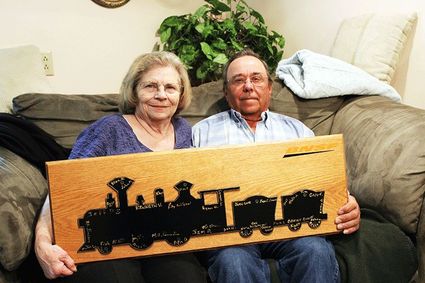Retired railroader Bob Cross is 2016 Festival Parade Marshal
September 21, 2016

Steve Edwards
Bob Cross, a retired railroad employee, will be the Parade Marshal for the Sugarbeet Festival parade this year. Cross is pictured with his wife, Pam, and they are holding a retirement plaque made and signed by his co-workers and presented when he retired in 2011 after a 33-year career with BNSF. The parade will wind through downtown Chinook at 4 pm on Saturday, September 24.
It's a tradition that each Sugarbeet Festival parade is led by a Parade Marshal who represents the industry being featured during the current celebration. With this year's salute to the railroad industry in the area, it seemed natural to have a retired railroad employee head up the parade. This year Bob Cross, who retired from BNSF with 33 years of service, along his wife Pam, will be at the front of the procession to greet spectators as the parade passes through downtown Chinook on Saturday afternoon.
Bob Cross started with the railroad in September, 1978
When Bob Cross started with the railroad it was the Burlington Northern Railroad, then commonly called "the BN." That railroad was formed from a merger of four major U.S. railroads and had an historical connection to Jim Hill, the railroad promoter who put the railroad across the Hi-Line. Cross started with the BN in 1978. In 1996, when BN bought another existing railroad, the name changed to Burlington Northern and Santa Fe Railroad and was shortened to the BNSF. The BNSF still is the major railroad in north central Montana and serves many other areas across the nation.
Bob Cross said, "When I started with the railroad I was 30 years old. I had no idea at that time I would end up staying and retiring." His first job was as a Laborer in the diesel shop in Havre. Then he became a machinist helper, working on engine repairs at the shop. He said, "I always had a mechanical interest and that was a good fit for me."
Eventually he became a part of the traveling pipe fitting crew. Cross described that crew as "really like plumbers. We maintained the ground facilities that the railroad owned. If a building sprung a water leak, we went there and fixed it." At one point, with a local reduction of the workforce, he took work with the railroad in Spokane for nearly a year.
He and his family returned to Chinook and Cross was laid off. That lay off lasted nearly five years. Asked how he survived he said, "Work was very hard to find around here at the time. I did everything from tending bar to working as a truck driver for a contractor putting in a power transmission line along the Hi-Line."
He was called back to work to the the Structures Department, doing much the same work as before-doing maintenance on facilities owned by the railroad. He remained in that job until he retired in 2011. He said much of the maintenance work on facilities is now contracted out.
Hearing this history of his 33 years with the railroad, I asked, "Were you ever actually on a train?" Cross laughed and said, "Only twice, and both times I was a passenger." It appears you can have a career with the railroad and not be directly involved with trains or tracks.
How railroading changed over a
third of a century
I was curious to ask how the railroad changed in the third of a century that Cross worked. He smiled and said, "I thought you might ask me something about that and I've been thinking about it. I believe the biggest change was how much more emphasis was put on the idea of working safely." Using his thumb and forefinger to show about a one-inch thickness, he said, "When I started with the railroad the safety manual was about this thick. By the time I retired the safety manual was five or six inches thick. There was a tremendous growth in the number of safety rules and emphasis on safety during the 30 years I worked."
The other big change Cross mentioned was the reduced number of people on the job. He said, "It was probably most noticeable with the rail crews where mechanization reduced the number of people needed for a lot of jobs." Readers who have been in farm and ranch country have seen the same trend, more mechanization means fewer people are needed to do the work.
Cross seems to have a lot of good memories about his career with the railroad. He showed me some safety awards he had won and the special winter coat he was given on his retirement. He noted, "I save the winter coat for special occasions." And the first thing he showed me when I arrived at his house was a special piece of artwork for his retirement that was made by his co-workers and signed by each of them.
Since retiring Cross has been working for a local rancher and staying active. He and Pam are looking forward to the Sugarbeet Festival this year and the recognition that railroading is enjoying during the festival. Maybe Bob will get to ride the little train being brought to the festival by BNSF. Heck, if that works out then he can say, "I worked for the railroad for 33 years and rode a train three times."






